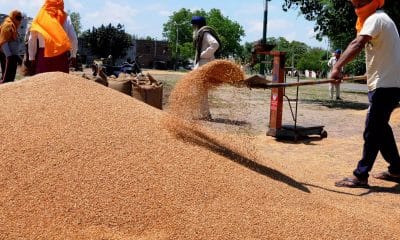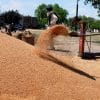Agriculture
Govt hikes wheat MSP by Rs 40 to Rs 2,015 per quintal
The government on Wednesday hiked the minimum support price for wheat by Rs 40 to Rs 2,015 per quintal to boost production as well as farmers’ income and asserted that the system of purchasing crops at support prices will continue.
The Cabinet Committee on Economic Affairs (CCEA), chaired by Prime Minister Narendra Modi, approved the increase in the Minimum Support Prices (MSPs) for six rabi (winter-sown) crops grown in 2021-22 crop year (July-June) and traded in Rabi Marketing Season (RMS) 2022-23.
In a tweet, the prime minister said the government has taken another big decision in the interest of farmers by increasing the MSPs of rabi crops.
He said the increased MSPs would ensure remunerative prices to farmers and also encourage them for sowing operations.
According to an official statement, wheat MSP has been raised by Rs 40 to Rs 2,015 per quintal. The cost of production of wheat is estimated at Rs 1,008 per quintal.
The support price for barley has been hiked by Rs 35 to Rs 1,635 per quintal for the 2021-22 crop year from Rs 1,600 per quintal in the previous year.
Among pulses, the MSP for gram has been increased by Rs 130 to Rs 5,230 per quintal from Rs 5,100 per quintal while that for lentil (masur) has been hiked by Rs 400 to Rs 5,500 per quintal from Rs 5,100 per quintal.
In the case of oilseeds, the government has increased the MSP for mustard seed by Rs 400 to Rs 5,050 per quintal for the 2021-22 crop year from Rs 4,650 per quintal in the previous year. Safflower MSP has been raised by Rs 114 to Rs 5,441 per quintal from Rs 5,327 per quintal.
MSP is the rate at which the government buys the grain from farmers. Currently, the government fixes MSPs for 23 crops grown in both kharif and rabi seasons.
Sowing of rabi (winter) crops begins from October immediately after the harvest of kharif (summer) crops. Wheat and mustard are major rabi crops.
Commenting on the CCEA decision, Agriculture Minister Narendra Singh Tomar said “some people try to create confusion that MSP system will end but the prime minister is committed and will always remain committed toward farmers’ cause. The prime minister has assured that MSP system will remain as it was earlier”.
In a video message posted on Twitter, the minister said that even after the enactment of the three new farm laws, the MSPs, production and procurement have increased. “No one should have any doubt on this”.
Thousands of farmers, mainly from Punjab, Haryana and Western Uttar Pradesh, have been protesting at Delhi borders for more than nine months now demanding repeal of the three new farm laws. The protesting farmers are also demanding a legal guarantee on MSPs as they fear that support price system might gradually end with the enactment of the three laws.
The Supreme Court has put on hold the implementation of the three laws.
The agriculture minister also highlighted that the MSPs for both wheat and mustard announced by the government are 100 per cent more than their cost of production.
Barley MSP is 60 per cent more than the production cost while support prices for gram and masur pulses are 74 per cent and 79 per cent higher, respectively, than the cost of production. In case of safflower, the MSP is 50 per cent up from production cost.
Tomar said the government had decided to fix the MSPs of all kharif and rabi crops at least 1.5 times more than their production cost and this has helped in enhancing the farmers’ income.
The Centre’s decision to procure pulses and oilseeds apart from wheat and paddy is also benefitting farmers, he added.
Food Corporation of India, the government’s nodal agency for procurement and distribution of foodgrains, purchased a record 43 million tonnes of wheat during the RMS 2021-22.
“Government has increased the MSP of rabi crops for the 2022-23 rabi marketing season to ensure remunerative prices to the growers for their produce,” the statement said.
The increase in MSPs for rabi crops for the 2022-23 marketing season is in line with the Union Budget 2018-19 announcement of fixing the MSPs at a level of at least 1.5 times of the average cost of production.
“The expected returns to farmers over their cost of production are estimated to be highest in case of wheat and mustard seed (100 per cent each), followed by lentil (79 per cent), gram (74 per cent ); barley (60 per cent) and safflower (50 per cent),” the statement said.
The government also said that concerted efforts were made over the last few years to realign the MSPs in favour of oilseeds, pulses and coarse cereals to encourage farmers to shift to larger area under these crops and adopt best technologies and farm practices to correct the demand-supply imbalance.
Additionally, a central scheme — National Mission on Edible Oils-Oil Palm (NMEO-OP) — recently announced by the government will help in increasing the domestic production of edible oils and reduce import dependency.
With the total outlay of Rs 11,040 crore for NMEO-OP, the scheme will not only aid in expanding area and productivity of the sector but also benefit the farmers by increasing their income and generation of additional employment, it added.








































